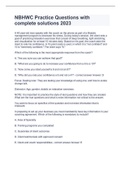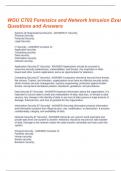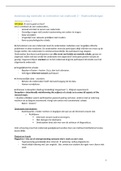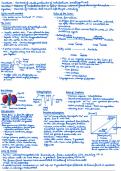Java Fundamentals
Final Assessment (Qns & Ans)
2025
General Instructions
1. Read All Questions Carefully: Make sure you understand each question.
2. Time Management: You have a specific amount of time to complete the exam.
Keep an eye on the clock and pace yourself.
3. Allowed Materials: Only use materials that are explicitly allowed. Unauthorized
materials can lead to disqualification.
4. ANS Format: Follow the required format for your ANS. For example, multiple-
choice questions might need you to select the best ANS, while essay questions
require detailed responses.
5. Academic Integrity: Adhere to the university's honor code. Any form of cheating or
plagiarism is strictly prohibited.
6. Technical Requirements: Ensure your computer and internet connection are
stable. For online exams, you might need a webcam and microphone for proctoring
purposes.
7. Submission: Submit your ANS before the time expires. Late submissions might
not be accepted.
©2024/2025
,1. Which of the following is true regarding the `Serializable`
interface in Java?
a) It is a marker interface.
b) It requires the class to implement the `writeObject()` method.
c) It is used for deep cloning of objects.
d) It can only be applied to interfaces.
ANS: a) It is a marker interface.
Rationale: The `Serializable` interface does not contain any
methods and is used to indicate that a class can be serialized.
2. Which keyword is used to prevent a method in Java from
being overridden?
a) final
b) static
c) private
d) protected
ANS: a) final
Rationale: When a method is declared with the `final`
keyword, it cannot be overridden in a subclass.
3. What is the purpose of the `transient` keyword in Java?
©2024/2025
, a) To prevent a variable from being changed.
b) To exclude a variable from serialization.
c) To mark methods as final.
d) To allow multiple threads to access a method.
ANS: b) To exclude a variable from serialization.
Rationale: Variables marked as `transient` are not serialized,
meaning they will not be saved during the serialization process.
4. In Java, which collection class allows duplicate elements and
maintains insertion order?
a) HashSet
b) TreeMap
c) ArrayList
d) HashMap
ANS: c) ArrayList
Rationale: `ArrayList` allows duplicate elements and
maintains the order of insertion.
5. Which of the following statements about Java interfaces is
incorrect?
a) An interface can have default methods.
b) An interface can extend multiple interfaces.
©2024/2025
, c) An interface can implement another interface.
d) All methods in interfaces are inherently public.
ANS: c) An interface can implement another interface.
Rationale: Interfaces can extend other interfaces but cannot
implement them.
Fill-in-the-Blank Questions
6. The ________ keyword in Java is used to declare a variable
that cannot change its value once assigned.
ANS: final
Rationale: The `final` keyword makes a variable immutable.
7. Java uses ________ to achieve polymorphism through method
overloading and method overriding.
ANS: dynamic method dispatch
Rationale: Polymorphism is achieved dynamically at runtime
for overridden methods.
8. In Java, the method __________ is responsible for allowing a
thread to enter a synchronized block.
ANS: wait()
©2024/2025










